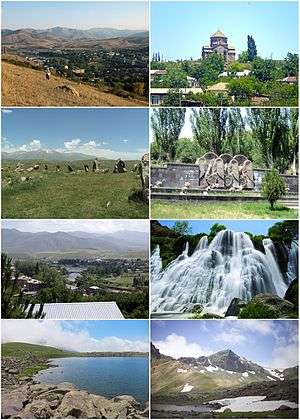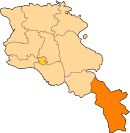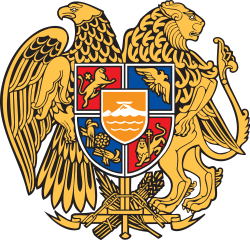Sisian
- For the town southwest of Sisian, formerly also called Sisian, see Hatsavan, Syunik.
| Sisian Սիսիան 02.10.2016 Sisian Mayor Artur Sargsyan | |
|---|---|
| community | |
|
From top left: Sisian skyline • Surp Hovhannes Monastery of 691 Zorats Karer archaeological site • Artsakh War memorial Vorotan River • Shaki Waterfall Tolors reservoir • Zangezur Mountains | |
 Sisian | |
| Coordinates: 39°31′15″N 46°01′56″E / 39.52083°N 46.03222°ECoordinates: 39°31′15″N 46°01′56″E / 39.52083°N 46.03222°E | |
| Country |
|
| Marz | Syunik |
| First mentioned | 8th century BC |
| Government | |
| • Mayor | Artur Sargsyan |
| Area | |
| • Total | 9 km2 (3 sq mi) |
| Elevation | 1,600 m (5,200 ft) |
| Population (2011 census) | |
| • Total | 14,894 |
| • Density | 1,700/km2 (4,300/sq mi) |
| Time zone | AMT (UTC+4) |
| Area code(s) | +374 2832 |
| Sources: Population[1] | |
Sisian (Armenian: Սիսիան), is a town in the southern Syunik Province of Armenia. It is located on Vorotan River, 6 km south of the Yerevan-Meghri highway, at a distance of 217 km from Yerevan and 115 km from Kapan.
Sisian was known as Sisakan, Sisian and Sisavan during the ancient times and later in the Middle Ages. However, the name Karakilisa which was used for the town by the Turkic rulers of Armenia, was kept until 1935.
In 1935, one of the old names, Sisavan, was restored. Finally in 1940, the town was renamed Sisian.[2]
As of the 2011 census, the population of the town is 14,894.
Etymology
The area of present-day Sisian was also known as Sisakan and Sisavan during ancient historical periods. According to Movses Khorenatsi, the name of Sisakan -and subsequently Sisian- was derived from Sisak,[3] a legendary ancestor of the Armenian princely house of Syuni.[4]
History
Historically, the territory of modern Sisian was part of Tsghuk canton (Armenian: Ծղուկք գավառ Tsghukk gavar), at the heart of the ancient province of Syunik, within Armenia Major. The area was first mentioned in history in the 8th century BC. During the 4th century, the nearby historic settlement of Shaghat became the residence of the princes and the religious leaders of Syunik. It remained the spiritual and the political center of the region until the end of the 10th century, when the fortified town of Kapan in the Baghk canton became the capital of the newly established Kingdom of Syunik-Baghk.[5]
Between the 16th and the 19th centuries, Sisian was known as Gharakilisa (Black Church) to Armenia's Turkic and Persian rules. In 1918, it became part of the First (Democratic) Republic of Armenia. With the Sovietization of Armenia, Sisian was included in the breakaway Republic of Mountainous Armenia between 26 April and 12 July 1921. After the Soviet Red Army entered the Zangezur region in July 1921, Sisian along with the towns of Goris, Kapan and Meghri fell under the Soviet rule. Between 1935 and 1940, the town was known as Sisavan.
International relations
Twin towns – Sister cities
Sisian is twinned with:
Notable natives
- Stepanos Orbelyan (1250-1305), Armenian nobleman, historian, and bishop
- Israel Ori (1658-1711), Armenian nobleman and diplomat
- Nicholas Adontz (1871-1942), Armenian historian
- Hamo Sahyan, (1914-1993), Armenian poet and translator
- Ashot Avagyan, (1958-), Armenian artist
References
| Wikimedia Commons has media related to Sisian. |
- ↑ Syunik
- ↑ (Azerbaijani) Regions of Armenian Soviet Socialist Republic
- ↑ (Armenian) Movses Khorenatsi. History of Armenia, 5th Century (Հայոց Պատմություն, Ե Դար). Annotated translation and commentary by Stepan Malkhasyants. Gagik Sarkisyan (ed.) Yerevan: Hayastan Publishing, 1997, 1.12, p. 88 ISBN 5-540-01192-9.
- ↑ (Armenian) Harutyunyan, Babken. «Սիսակ» (Sisak). Soviet Armenian Encyclopedia. vol. x. Yerevan, Armenian SSR: Armenian Academy of Sciences, 1984, p. 399.
- ↑ http://hpj.asj-oa.am/969/1/1966-3(221).pdf Kingdom of Syunik



